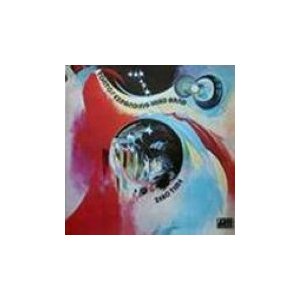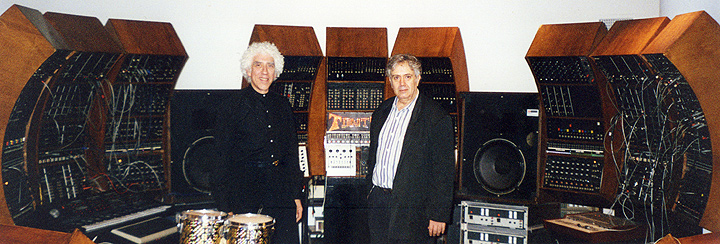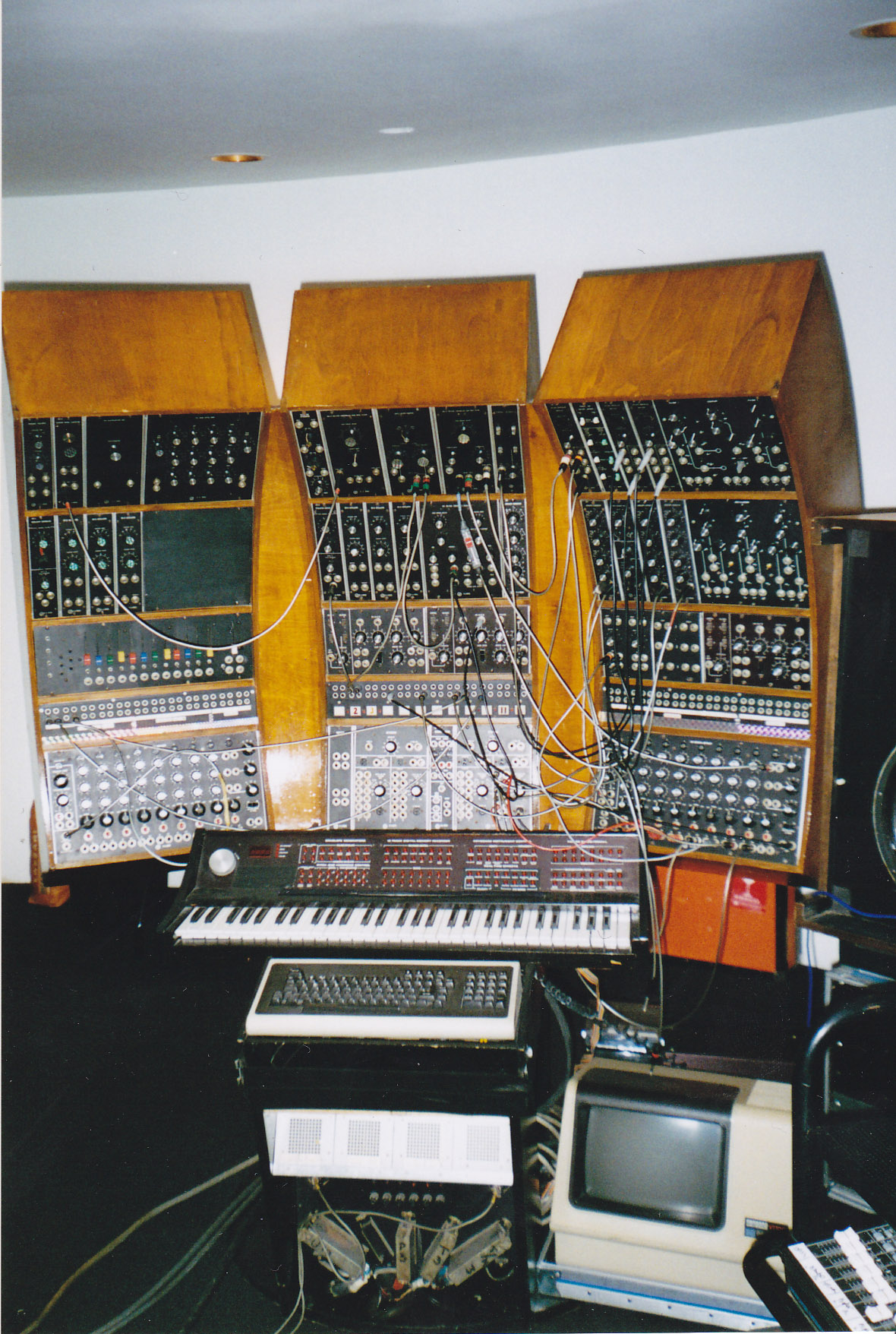A thread in the Progressive Ears Forum, got me thinking again about Tonto’s Expanding Headband, the pioneering electronic band that preceded Kraftwerk, Jean-Michel Jarre, Tangerine Dream and Schulz Klaus by a few years in creating a sequencer driven music. It made me realize that this is the 40th Anniversary of their first album, Zero Time. So with that in mind, I bring you a 15 year old Echoes interview with Tonto’s Robert Margouleff and Malcolm Cecil. You can also read my even earlier interview with Malcolm Cecil in the book, Synth Gods.
It has been 25 years since Tonto first took flight on the 1971 album, “Zero Time.” you may have never heard the CD, but it’s influence reverberated throughout space music and popular music. Just look at the credits on 70s albums by Quincy Jones, The Isley Brothers, Minnie Ripperton and many others and you’ll see the names of Malcolm Cecil And Robert Margouleff, the creators of Tonto. But their most important connection remains Stevie Wonder. Wonder’s brilliant mid-70s quartet that includes Music Of My Mind, Talking Book, Innervision And Fullfillingness’ First Finale was mid-wifed by Malcolm Cecil And Robert Margouleff along with the Tonto synthesizer. We go back to zero time with Tonto’s Expanding Headband.
SFX
In the Mutato Musica studios of Devo In Los Angeles, 60 year old Malcolm Cecil is negotiating a spaghetti of wires, cables and keyboards, hunched under the imposing presence of Tonto, an acronym for The Original New Timbral Orchestra.
SFX
It’s difficult to believe that this lumbering behemoth of knobs, buttons and blinking lights set off in 10 modular curved cases produced the sounds of the influential album, “Zero Time.”
MUSIK Cybernaut
 British born Malcolm Cecil was a classical trained bass player, turned jazz musician turned studio engineer. Robert Margouleff was a lapsed operatic tenor turned film producer. When he needed music for his self-produced movie, Ciao Manhattan, he bought a Moog synthesizer and became the house synthesist at Media Sound Studios in New York where he met the house engineer, Malcolm Cecil. They began working together and slowly began acquiring electronic modules. The Moog synthesizer was still a novelty in 1971, and Margouleff And Cecil, coming from straight music backgrounds, weren’t sure their first piece was even music.
British born Malcolm Cecil was a classical trained bass player, turned jazz musician turned studio engineer. Robert Margouleff was a lapsed operatic tenor turned film producer. When he needed music for his self-produced movie, Ciao Manhattan, he bought a Moog synthesizer and became the house synthesist at Media Sound Studios in New York where he met the house engineer, Malcolm Cecil. They began working together and slowly began acquiring electronic modules. The Moog synthesizer was still a novelty in 1971, and Margouleff And Cecil, coming from straight music backgrounds, weren’t sure their first piece was even music.
MC: Yeah. Originally Aurora was 27 minutes long and it’s one of the pieces that Bob was working on when we met
RM: I said to him , Malcolm, I’m not even sure if this is music.
MC: It turned out to be a really, I suppose a very sort of primal piece. It’s sort of ageless.
After getting a label deal, Robert Margouleff And Malcolm Cecil began composing the music for Zero Time. By now, their synthesizer had a name: The Original New Timbral Orchestra or TONTO. And that spawned the name of the group, Tonto’s Expanding Headband. It was a reflection on the psychedelic culture at the time.
MC: Oh definitely. It was, that’s where the expanding headband concept was. I mean the play on words and that was the right out of the silver 60s. We were totally in to the psychedelic culture.
Musik
Many of the elements we take for granted with synthesizers today, took painstaking and circuitous paths to accomplish with tonto. Both Margouleff And Cecil would play the instrument simultaneously, one performing the melody, while another shaped the notes. Firing up TONTO, Malcolm Cecil gets Echoes producer Jeff Towne to play a bongo that is electronically linked to the synthesizer, while Cecil plays a keyboard.
DEMO, TALKS So [31:55 plays]. Very Tontosish I should say.
This is a rough and ready demo, but a more precise example can be heard on the piece “riversong” on which Cecil And Margouleff synthesized a voice.
MC: It was our attempt at voice synthesis where the, see Bob is trained as a tenor. He’s an operatic tenor. And he, so he has all the understanding of the vocal. The melodic lines were, I was playing on the keyboard and Bob was creating the words and we worked together to create the sound that ended up being the vocal which is somewhat unintelligible but it was sort of like, but we had terrible difficulty making consonants and Ks and the one thing that still irks me to this day that I’ve always wanted to fix was the line in there which is the whole major line of the whole thing. It says I’m the river, I’m the river, but I’m not the current. And, it comes out I am the errant. [Laughs]
MUSIK
TONTO would probably be a tiny foot note in modern music if one day, Steve Wonder hadn’t walked into the studio after bass player named Ronnie Blanco played Zero Time for him.
MC: He played the album to Stevie and who, he told Stevie that this was a keyboard instrument that he needed to check out….. Anyway, there was a ring at the bell and it turns out to be Ronnie Blanco. He says, come down here I’ve got somebody who wants to check out Tonto…. And anyway so we went into the studio and who walks in on Ronnie Blanco’s arm with our album on the other arm is Stevie. And he came into the studio. And that first weekend we put down 17 songs.
MUSIK
Robert Margouleff And Malcolm Cecil would produce and play on the four quintessential Stevie Wonder albums, “Music Of My Mind,” “Talking Book,” “Innervision” And “Fullfingness First Finale.” They went on to produce hit albums for The Isley Brothers And Minnie Ripperton, and then Margouleff went on to produce Devo’s “Freedom Of Choice” and Shadowfaxes “The Odd Get Even”. Cecil had a longtime producing relationship with Gil Scott Heron.
Now they’re firing up TONTO again, trying to capitalize on the techno sound that they helped inspire. Malcolm Cecil And Robert Margouleff are well abreast of contemporary technology, but they still think, 25 years later, there’s something special in TONTO.
RM: It’s an instrument, okay? And it’s one kind of an instrument. There’s no other instrument like it. It has its own process and its own thing and after all, there’s a few things you can say about instrument that was designed on a tablecloth, you know? It has its own kind of magic.
The first Tonto’s Expanding Headband album, Zero Time was re-released in its entirety along with tracks from a second album that came out in europe. The collection is called “Tonto Rides Again” On Viceroy Records.
MUSIK OUT
Wikipedia also has a very good entry on TONTO. Look for a Tribute To TONTO in the fall on Echoes.
John Diliberto ((( Echoes )))


